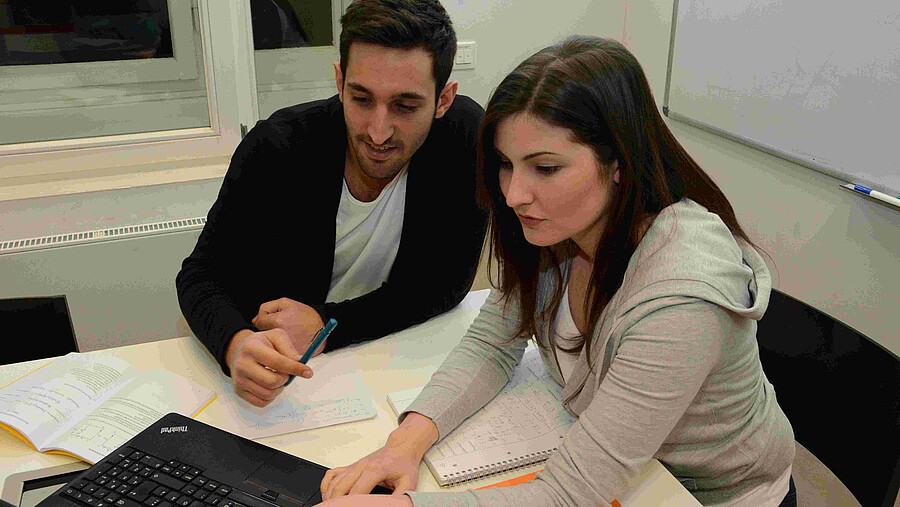Computer Science
(Master of Science)
Profile
Part-time study is optional.
Instruction language: German
German HZB: none
International application: German C1
Instruction language: English
English C1
Find out more
Stay abroad possible, but not obligatory.
Short Description
The Master’s degree programme in Computer Science offers students in-depth training in areas of computer science. Students gain the skills required to independently and comprehensively understand and structure computer science issues and their applications, and to develop abstract models. These skills enable students to define solutions that comply with state-of-the-art computer science in terms of technology and science. As part of the degree programme, students specialise in the computer science subjects of their choice and set their own focus.
The Master’s degree programme in Computer Science prepares students for a career in various sectors of industry and the economy, enabling them to produce scientific work independently. The degree qualifies graduates to work independently and to take on managerial roles in the fields of computer science and information technology. It also entitles graduates to embark on doctoral studies.
As a special feature, the Master's degree programme in Computer Science offers a double degree programme in cooperation with TU Wien. Students gain international experience and establish initial contacts with international researchers and companies as part of the integrated study abroad programme. A double degree opens up excellent career opportunities for graduates in international and national companies as well as when applying for international doctoral programmes.
Course Content
- Computational Health Informatics
- Data Science and Digital Libraries
- Databases and Information systems
- Digital Education and Didactics of Computer Science
- IT security and Human-computer Interaction
- Management of Scientific Data
- Machine Learning and Machine Language Processing
- Software Engineering and Human-computer Interaction
- System and Computer Architecture
- Theoretical Computer Science
- Reliable and Scalable Software Systems
- Visual Analytics and knowledge-based Systems
Note: The Master’s degree proramme in Computer Science can be studied in English and German. Courses are offered in English and/or German, but not all courses are available in English. We have enough modules to obtain a Master's degree by attending lectures in English only, but with a smaller choice.
In the Master's programme, students specialise in computer science subjects of their choice, e.g.
- Computational Health Informatics,
- Data Science and Digital Libraries,
- Databases and Information Systems,
- IT-Security,
- Natural Language Processing,
- Machine Learning,
- Human-Computer Interaction,
- Scientific Data Management,
- Software Engineering,
- System and Computer Architecture,
- Theoretical Computer Science,
- Reliable and Scalable Software Systems,
- Visual Analytics
- or Knowledge-based Systems.
These specialisations can be combined into "professcional specialism"; currently these are the areas of "Data Science", "Human-Centered Computing" and "Systems-oriented Computer Science". Another focus can be placed in the area of "Theoretical Computer Science and Foundations of Artificial Intelligence" as part of a double-degree programme together with TU Wien.
The study of a minor subject and a industrial placement can also be completed as an option. Key skills such as foreign languages, visualisation and presentation, communication skills and teamwork are practised in the general studies programme. The degree programme concludes with the Master's thesis (scheduled for the fourth semester).
| 1 | 2 | 3 | 4 |
|---|---|---|---|
| 4 Module Informatik (je 5 LP) | 4 Module Informatik (je 5 LP) | 2 Module Informatik (je 5 LP) | Masterarbeit (30 LP) |
| Modul Informatik ODER Grundlagen der Informatik (5 LP) | Studium Generale (3-6 LP) | Betriebspraktikum (15 LP) ODER 3 Module Informatik (je 5 LP) | |
| Modul Informatik ODER Grundlagen der Informatik ODER Nebenfach (5 LP) | Modul Informatik ODER Grundlagen der Informatik ODER Nebenfach (5 LP) | Modul Informatik ODER Grundlagen der Informatik ODER Nebenfach (5 LP) |
Students should have an in-depth knowledge of the fundamentals of computer science, particularly in the areas of: programming, data structures and algorithms, compilers and software technology, computer hardware and architecture, analysis, linear algebra, stochastics, discrete mathematics and mathematical logic. English language skills are recommended because students may choose a number of lectures that are held in English.
Graduates find employment in all areas of industry, the economy, administration and the service industry. Job opportunities are available, for instance, in companies concerned with information and communication technologies, energy technology, medical technology and automotive engineering. The key tasks involve developing application-oriented software, tools and relevant processes. There are many areas of application open to computer scientists, offering them all kinds of career opportunities and the opportunity to specialise in line with their individual interests.
Admission Requirements
An undergraduate degree in a related field of study, such as
For master's degree programmes with restricted admission, places shall be allocated according to the university’s own selection procedure, if there are more applicants fulfilling the admission requirements than there are places available. The exact admission requirements can be found in the admission regulations:
Application Deadlines
First-year students from Germany and the EU
- June 1st – July 15th of the year for the winter semester
- December 1st – January 15th of the year for the summer semester
First-year students from non-EU countries (VPD from uni-assist is required)
- April 15th – May 31st of the year for the winter semester
- October 15th – November 30th of the previous year for the summer semester
Students resuming their studies and transfer students from Germany and the EU (application in a higher semester)
- June 1st – July 15th of the year for the winter semester
- December 1st – January 15th of the year for the summer semester
Students resuming their studies and transfer students from non-EU countries (application in a higher semester)
- April 15th – May 31st of the year for the winter semester
- October 15th – November 30th of the previous year for the summer semester
Do you have questions about studying? We are happy to help!

30167 Hannover

30167 Hannover











